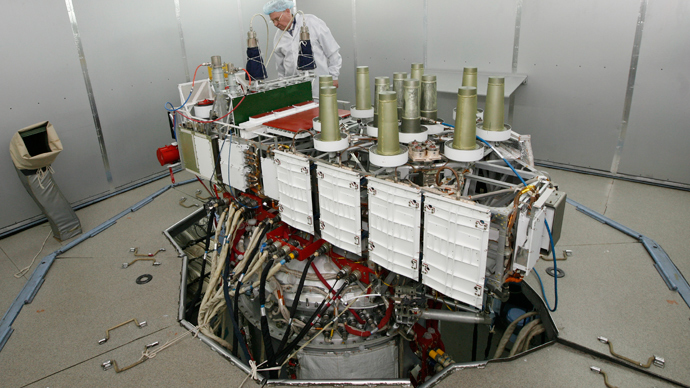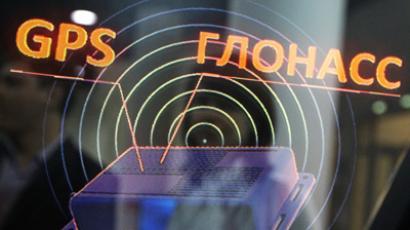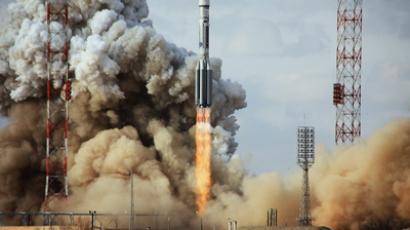Spy fears: CIA, Pentagon ‘work against’ Russia building GLONASS station in US
US intelligence and military are pressing the State Department not to license construction of monitor stations for Russia’s GLONASS navigation system on US territory, media reveals. The stations reportedly spark fears of spying opportunities.
Moscow sent a request to build monitor stations for GLONASS, a
Russian satellite system similar to GPS, on US territory in May
2012.
The White House has been pondering over the proposal ever since.
A number of meetings between Russian and American authorities on
the GLONASS monitor stations in the US have taken place, but so
far US security and military agencies have not agreed about how
to react to Moscow’s request.
The CIA and Pentagon suspect that such stations could be used for
collecting intelligence data and other military purposes, like
collecting exact coordinates of covert facilities in the US for
precision missile guidance, a weekend report in The New York
Times revealed.
“In recent months, the Central Intelligence Agency and the
Pentagon have been quietly waging a campaign to stop the State
Department from allowing Roscosmos… to build about half a dozen
of these structures, known as monitor stations, on United States
soil,” the report alleges, quoting anonymous US
officials.
The concerns are that the stations might help Moscow spy on the US as well as improve the precision of Russian weaponry.

Also, American lawmakers don’t like the idea of cooperating with
the direct rival of the US national Global Positioning System.
Last week Mike D. Rogers, Republican Representative of Alabama,
wrote a mailout to Secretary of State John Kerry, Defense
Secretary Chuck Hagel and the director of national intelligence,
James R. Clapper, demanding their assessment of the Russian
proposal on the question of national security.
Apart from the US and Russia, China and the EU are also
developing satnav systems of their own, Baidu and Galileo
respectively.
“They don’t want to be reliant on the American system and
believe that their systems, like GPS, will spawn other industries
and applications,” a former senior official in the State
Department’s Office of Space and Advanced Technology told the
newspaper. “They feel as though they are losing a
technological edge to us in an important market. Look at
everything GPS has done on things like your phone and the
movement of planes and ships.”
Still, the White House so far has been opposing accusations of
the US intelligence community against Russia as “It doesn't see
them as a threat,” an unidentified administration official said.
The Obama administration is currently trying to mend
Russian-American relations, damaged over Syria and asylum to
former National Security Agency contractor Edward Snowden, who
revealed document-supported evidence of the US spying on
unprecedented levels over global networks, including after their
closest allies.
In October 2012 Vitaly Davydov, the former deputy of Russia’s
Roskosmos space agency, revealed that Moscow needs to deploy
eight monitor stations in the US for correct operation of the
system in North America. He also disclosed that 19 monitor
stations of American GPS positioning system were operable in
Russia as of 2012.
On the contrary, in the latest report on the GLONASS in the US,
the NYT claims that there are no GPS monitor stations in Russia
whatsoever.
What is GLONASS
The development of the GLONASS global navigation system began in
the Soviet Union, which put the very first satellite of the
system into orbit on October 12, 1982. The system was officially
commissioned on September 24, 1993.
Despite a number of faulty rocket launches with GLONASS
satellites in recent years, today the GLONASS orbit group
consists of 27 satellites, of which 24 ensure global navigation
and the remaining three are either in reserve or perform
experimental equipment tests.
Russia has been deploying augmentation system stations abroad for
some time already. So far there are 14 monitor stations in
Russia, one in Brazil and one on Antarctica's continent at
Russia’s Bellingshausen station.
More GLONASS stations are expected to be built in the nearest
future: eight in Russia, two in Brazil, one in Australia, Cuba,
Indonesia, Spain, Vietnam and an additional station in the
Antarctic.
It was confirmed earlier in November that starting from 2014 all mobile phones and portable handheld devices with navigation functions, either imported or produced in Russia, must be equipped with GLONASS, or GLONASS and GPS microchips.

Today GLONASS is supported on products from world-leading
handheld device producers, such as Samsung, Nokia, Apple,
Motorola and others, simultaneously with GPS. This has become
possible largely because leading producers of microchips, such as
Qualcomm, have started producing GLONASS-enabled chipsets.
The introduction of a new positioning system has been welcomed by
customers worldwide, because using both GLONASS and GPS systems
increases the precision of positioning. European EGNOS project
unites signals from both systems and gives precision positioning
down to between 1.5 and 3 meters in Europe.
Within the next decade GLONASS is expected to replace existing satellites with new generation platforms that would enable 0.1 meter precision positioning anywhere in the world, except the polar regions of the planet.














